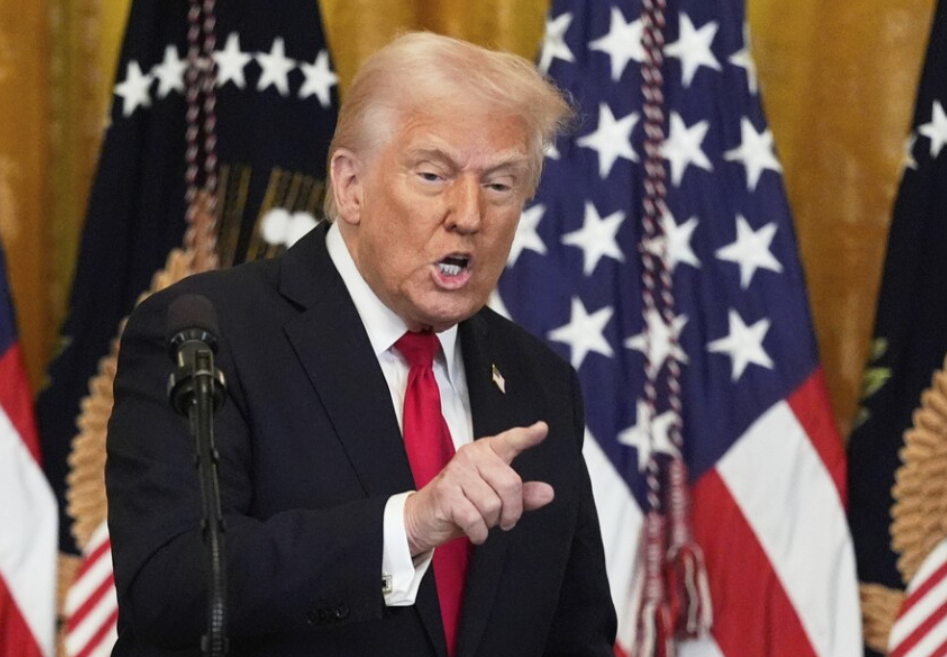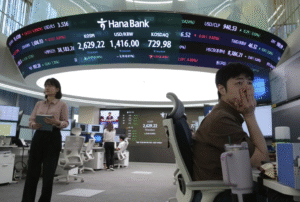Global stock markets mostly dipped on Thursday after President Donald Trump announced a 25% tariff on imported cars. Trump explained that the tariff was aimed at boosting U.S. manufacturing, but the effects could be complex, as both U.S. automakers and foreign companies with factories in the U.S. rely on parts sourced from various countries. In pre-market trading, General Motors’ shares dropped by 6.5%, while Ford Motor’s stock fell 3%.
In Europe, France’s CAC 40 declined by 0.6% to 7,982.08, Germany’s DAX dropped by 0.8% to 22,661.50, and Britain’s FTSE 100 fell by 0.7% to 8,632.12. Futures for the S&P 500 rose by 0.1%, and those for the Dow Jones Industrial Average gained 0.2%.
In Asia, Japan’s Nikkei 225 dropped 0.6%, closing at 37,799.97, with automaker stocks taking a significant hit. Toyota’s shares fell by 2%, Honda dropped 2.5%, and Nissan lost 1.7%. Mazda saw a sharp decline of 6%, Subaru dropped nearly 5%, and Mitsubishi Motors fell by 3.2%. Japanese Prime Minister Shigeru Ishiba has been working to convince President Trump to exempt Japan from the higher tariffs and reaffirmed his stance on Thursday. “We strongly request that tariff measures not be applied to Japan,” Japanese Prime Minister Shigeru Ishiba told reporters. When asked about potential responses, he stated, without providing specifics, “All options are naturally subject to consideration.” Ivan Espinosa, who will take over as CEO of Nissan Motor Corp. on April 1, said earlier this week that the company was exploring various scenarios, as the situation with Trump’s decision remains uncertain. Toyota declined to comment.
South Korea’s Kospi dropped 1.4% to 2,607.15, with local automakers also affected by Trump’s tariff announcement. Hyundai Motor’s shares in Seoul fell 4.3%, while Kia’s stock dropped 3.5%. In Greater China, excluding Taiwan, shares saw positive movement. Hong Kong’s Hang Seng rose 0.4% to 23,578.80, and the Shanghai Composite gained 0.2%, reaching 3,373.75. Chinese automakers and parts manufacturers have been growing their global sales, but not in the United States, so the impact of the tariff announcement would be indirect for them.
Taiwan’s benchmark Taiex index fell 1.4%, while in Australia, the S&P/ASX 200 decreased by 0.4%, closing at 7,969.00. Analysts predict that trade tensions are likely to escalate in the coming weeks. “Rising trade barriers could disrupt supply chains and slow economic growth. Industries like autos, metals, pharmaceuticals, and technology will face a direct impact from U.S. tariffs,” said Eunice Tan, head of Asia-Pacific credit research at S&P Global Ratings. “Concerns about a potential global downturn may dampen demand and confidence, particularly affecting the region’s downstream and consumer discretionary sectors.”
On Wednesday, the S&P 500 fell 1.1%, and the Dow industrials dropped 0.3%. A decline in Big Tech stocks pushed the Nasdaq composite to a 2% drop, closing at 17,889.01. Several U.S. automakers saw stock declines following Trump’s announcement of new tariffs on auto imports. U.S. auto manufacturers have already diversified their production across North America due to previous free-trade agreements involving the U.S., Canada, and Mexico.
Early Thursday, benchmark U.S. crude dropped by 15 cents, settling at $69.50 per barrel. Brent crude, the international benchmark, declined by 17 cents, reaching $72.89 per barrel. In currency trading, the U.S. dollar strengthened, rising to 150.87 Japanese yen from 150.54 yen. The euro increased slightly to $1.0765, up from $1.0754.














